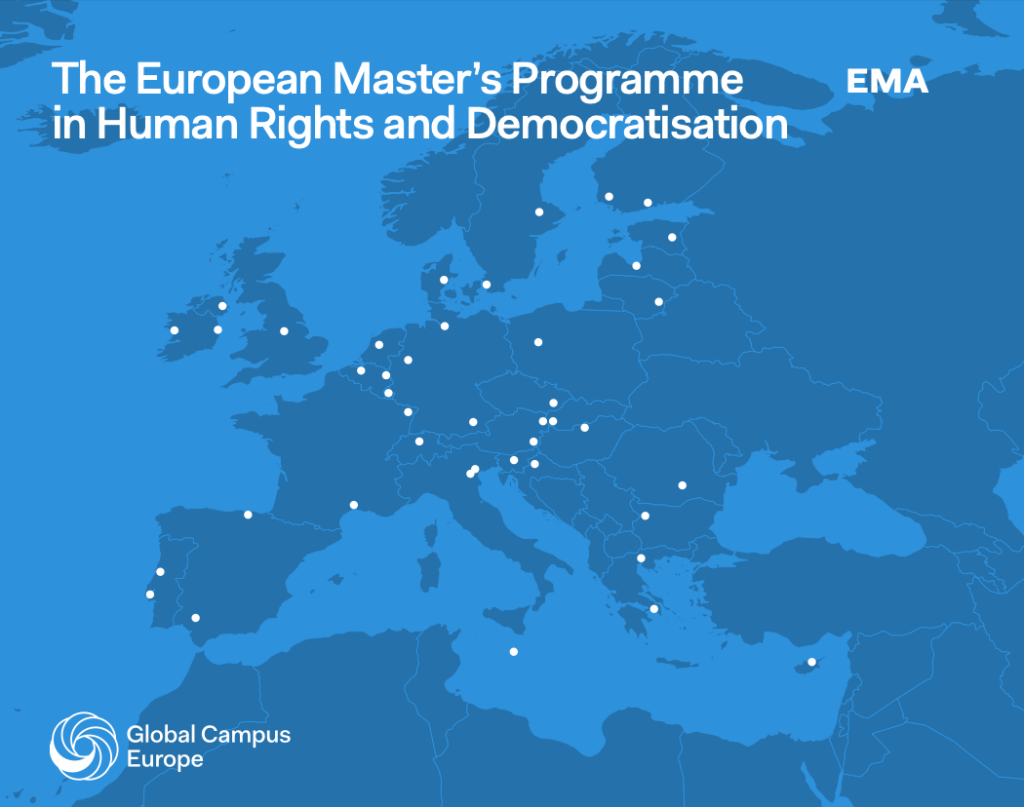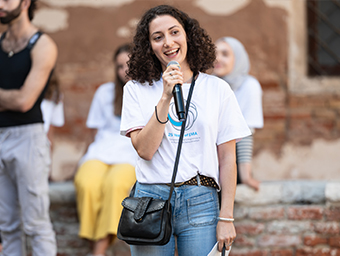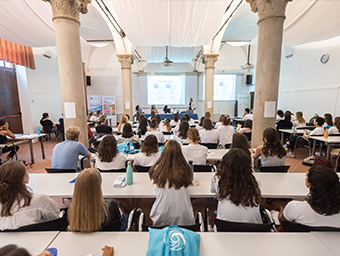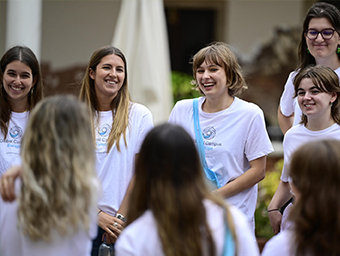Global Campus
Europe
The European Master's Programme in Human Rights and Democratisation (EMA)

Date & place
September 2025, Venice
Duration
12 months
Requirements
Degree (minimum 180 ECTS credits) in a field relevant to human rights
Coordinators
Global Campus of Human Rights HQ, University of Padua, Italy
The oldest interdisciplinary and inter-university Master’s programme in human rights and democracy in Europe, shaping global experts.
Overview
The European Master's Programme in Human Rights and Democratisation (EMA - GC Europe)
is an interdisciplinary programme that provides a practice and policy-oriented approach to learning that combines legal, political, historical, anthropological, and philosophical perspectives of human rights and democratisation with skill-building activities and a field trip exercise. Established in 1997, it is the longest running master’s programme in the Global Campus and a unique example of inter-university cooperation. The Diploma (60 ECTS credits) is jointly conferred by 7 prestigious EMA member universities located in Austria, Germany, Italy, Slovenia and Spain.

People
Prof. Thérèse Murphy (Elected Chairperson) / Orla Ní Cheallacháin / George Ulrich / Inge Zwart / Judit Villena Rodó / Chiara Altafin / Elisabetta Zennaro / Martina Urbinati / Stefania Saccarola
Regional Network
- University of Graz, Austria
- University of Vienna, Austria
- KU Leuven, Belgium
- Université Libre de Bruxelles (ULB), Belgium
- Sofia University St Kliment Ohridski, Bulgaria
- University of Zagreb, Croatia
- University of Cyprus, Cyprus
- Masaryk University of Brno, Czech Republic
- University of Southern Denmark / Danish Institute for Human Rights, Denmark
- University of Tartu, Estonia
- Åbo Akademi University, Finland
- University of Helsinki, Finland
- Université de Strasbourg, France
- Université de Montpellier, France
- Ruhr-University Bochum, Germany
- University of Hamburg, Germany
- Bundeswehr University Munich, Germany
- Aristotle University of Thessaloniki, Greece
- Panteion University Athens, Greece
- Eotvos Lorand University Budapest, Hungary
- University of Galway, Ireland
- University College Dublin, Ireland
- University of Padua, Italy
- Ca’ Foscari University of Venice, Italy
- University of Latvia, Latvia
- University of Vilnius, Lithuania
- Université du Luxembourg, Luxembourg
- University of Malta, Malta
- Maastricht University, the Netherlands
- Utrecht University, the Netherlands
- Adam Mickiewicz University, Poland
- University of Coimbra, Portugal
- New University of Lisbon, Portugal
- University of Bucharest, Romania
- Comenius University, Bratislava, Slovakia
- University of Ljubljana, Slovenia
- University of Deusto, Bilbao, Spain
- University of Seville, Spain
- Lund University, Sweden
- Uppsala University, Sweden
- University of Lucerne (Institute of Social Ethics), Switzerland
- University of Nottingham, United Kingdom
- Queen’s University Belfast, United Kingdom




Programme Details
– 1st Semester: September to December | Global Campus of Human Rights HQ
Students are taught by leading academics representing the 43 EMA participating universities, representatives of international organisations (including the European Union, the United Nations and the Council of Europe), NGO experts and activists and human rights defenders. The semester is structured into five core thematic sections (TS) and elective specialised modules (Advanced Cluster Classes and Rolling Seminars) devised for smaller groups and skill building activities
- TS1: Human Rights Institutions, Mechanisms and Standards
- TS2: Globalisation, Development and Human Rights
- TS3: Human Rights in Context: Historical, Philosophical, Anthropological and Religious Perspectives
- TS4: Building and Protecting Democracy
- TS5: Human Rights, Peace and Security
Students also participate in simulation exercises such as ECHR Moot Court, ESCR Moot Committee, ICC Moot Court and a mediation simulation.
– Field trip in Kosovo: mid-January
Provides insights into the practical tasks, difficulties, and expectations human rights officers face in the field. It comprises visits to international organisations as well as local and regional NGOs working on human rights issues, such as property claims, torture related questions, legal advice, women’s rights, democratic elections, free media and children’s rights.
– 2nd Semester: February to June | Member Universities across Europe
This semester is conceived as a European exchange: students relocate to one of the 43 EMA participating universities to follow courses in an area of specialisation of their choice and to undertake personal supervised research finalised in the writing of the master’s thesis.
- University of Vienna (Austria)
- University of Graz (Austria)
- KU Leuven (Belgium)
- Université Libre de Bruxelles (Belgium)
- Sofia University St Kliment Ohridski (Bulgaria)
- University of Zagreb (Croatia)
- University of Cyprus (Cyprus)
- Masaryk University of Brno (Czech Republic)
- University of Southern Denmark / Danish Institute for Human Rights (Denmark)
- University of Tartu (Estonia)
- Åbo Akademi University (Finland)
- University of Helsinki (Finland)
- Université de Strasbourg (France)
- Université de Montpellier (France)
- Ruhr-University Bochum (Germany)
- University of the Bundeswehr Munich (Germany)
- University of Hamburg (Germany)
- Aristotle University of Thessaloniki (Greece)
- Panteion University Athens (Greece)
- Eotvos Lorand University Budapest (Hungary)
- University of Galway (Ireland)
- University College Dublin (Ireland)
- University of Padua (Italy)
- Ca’ Foscari University of Venice (Italy)
- University of Latvia (Latvia)
- University of Vilnius (Lithuania)
- Université du Luxembourg (Luxembourg)
- University of Malta (Malta)
- Maastricht University (the Netherlands)
- Utrecht University (the Netherlands)
- Adam Mickiewicz University, Poznan / Poznan Human Rights Centre (Poland)
- University of Coimbra (Portugal)
- New University of Lisbon (Portugal)
- University of Bucharest (Romania)
- Comenius University, Bratislava (Slovakia)
- University of Ljubljana (Slovenia)
- University of Deusto (Spain)
- University of Seville (Spain)
- Lund University (Sweden)
- Uppsala University (Sweden)
- Institute of Social Ethics – University of Lucerne (Switzerland)
- University of Nottingham (United Kingdom)
- Queen’s University, Belfast (United Kingdom)
- University degree of a high standard in a field relevant to human rights, including disciplines in Law, Social Sciences and Humanities, and must have a minimum of 180 ECTS (Bachelor/General Degree).
- Certified knowledge of English at least at level B2. Accepted certificates are IELTS (min. score 6), TOEFL (min. 80 for the IBT) and Cambridge exams (min. score 160-179), obtained no more than 3 years before the start of the programme.
- Academic track record (submission of a current transcript of exams)
- Applications will be assessed against the following selection criteria: academic ability and background, relevant additional academic work, courses or publications, relevant practical experience and motivation
Maximum number of accepted students: 90
- € 5,650 euros (plus application processing fee of €50)
- A small number of scholarships is available for qualified candidates. Scholarships include a tuition waiver and a modest stipend.
Many graduates find job opportunities with human rights organisations (both governmental and non-governmental, international and national), which might put them to work in field missions (electoral observation, human rights monitoring, international cooperation projects) or as officials taking care of the activities carried out at headquarters. In a number of cases, graduates are involved in human rights-related activities by their home Ministries of Foreign Affairs or are seconded by them to work for international institutions. Some graduates pursue further academic studies and research. On average, 96% of our graduates are employed within the first 6 months following graduation.
Is EMA for you? Learn about the programme’s key features and if you are the right candidate!
EMA: Your gateway to a global career in Human Rights.
EMA is a dynamic and demanding programme that requires a lot of engagement. With our 43 participating universities and associated institutions, we are able to present rich and varied perspectives on human rights and democratisation that no single department or faculty can offer.